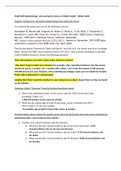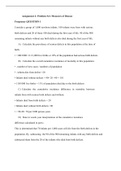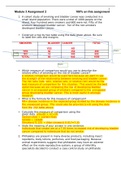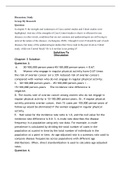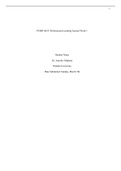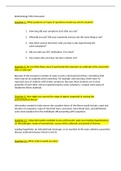Pubh6035 - Study guides, Class notes & Summaries
Looking for the best study guides, study notes and summaries about Pubh6035? On this page you'll find 57 study documents about Pubh6035.
Page 4 out of 57 results
Sort by
PUBH6035 Module 2 Assignment 1; Case Study - Descriptive Epidemiology
PUBH6035 Module 2 Assignment 2; Problem Set - Measures of Disease Frequency
PUBH6035 Module 3 Assignment 2; Problem Set Measures of Association and Impact
PUBH6035 Module 3 Discussion; Study Group
PUBH6035 Module 1 Assignment; Professional Learning Journal
PUBH6035 Module 6 Discussion; Study Group Outbreak Disease Detective
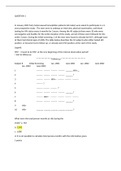
-
PUBH 6035 Module 7 Final Exam
- Exam (elaborations) • 39 pages • 2022
-
- $40.48
- + learn more
1. Question: What were the total person-months at risk during the study? 2. Question: A cohort study of coffee drinking and anxiety was conducted at a university campus. There were a total of 30,000 freshmen who participated. 10,000 were coffee drinkers and 20,000 were not. Of the coffee drinkers, 500 developed anxiety during the 4-year follow-up period. Of the non-coffee drinkers, 200 developed anxiety during the same time period. Assume that no one in the population died or was lost during th...
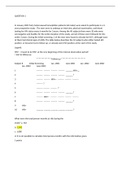
-
Epidemiology Decoding the Science of Public Health
- Exam (elaborations) • 39 pages • 2022
-
- $29.99
- + learn more
1. Question: What were the total person-months at risk during the study? 2. Question: A cohort study of coffee drinking and anxiety was conducted at a university campus. There were a total of 30,000 freshmen who participated. 10,000 were coffee drinkers and 20,000 were not. Of the coffee drinkers, 500 developed anxiety during the 4-year follow-up period. Of the non-coffee drinkers, 200 developed anxiety during the same time period. Assume that no one in the population died or was lost during th...
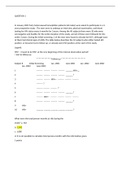
-
PUBH 6035 Module 7 Final Exam
- Exam (elaborations) • 39 pages • 2022
-
- $45.49
- + learn more
1. Question: What were the total person-months at risk during the study? 2. Question: A cohort study of coffee drinking and anxiety was conducted at a university campus. There were a total of 30,000 freshmen who participated. 10,000 were coffee drinkers and 20,000 were not. Of the coffee drinkers, 500 developed anxiety during the 4-year follow-up period. Of the non-coffee drinkers, 200 developed anxiety during the same time period. Assume that no one in the population died or was lost during th...
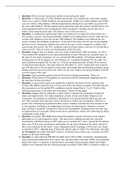
-
PUBH 6035 Module 7 Final Exam
- Exam (elaborations) • 7 pages • 2022
-
- $20.49
- + learn more
1. Question: What were the total person-months at risk during the study? 2. Question: A cohort study of coffee drinking and anxiety was conducted at a university campus. There were a total of 30,000 freshmen who participated. 10,000 were coffee drinkers and 20,000 were not. Of the coffee drinkers, 500 developed anxiety during the 4-year follow-up period. Of the non-coffee drinkers, 200 developed anxiety during the same time period. Assume that no one in the population died or was lost during th...

How did he do that? By selling his study resources on Stuvia. Try it yourself! Discover all about earning on Stuvia

